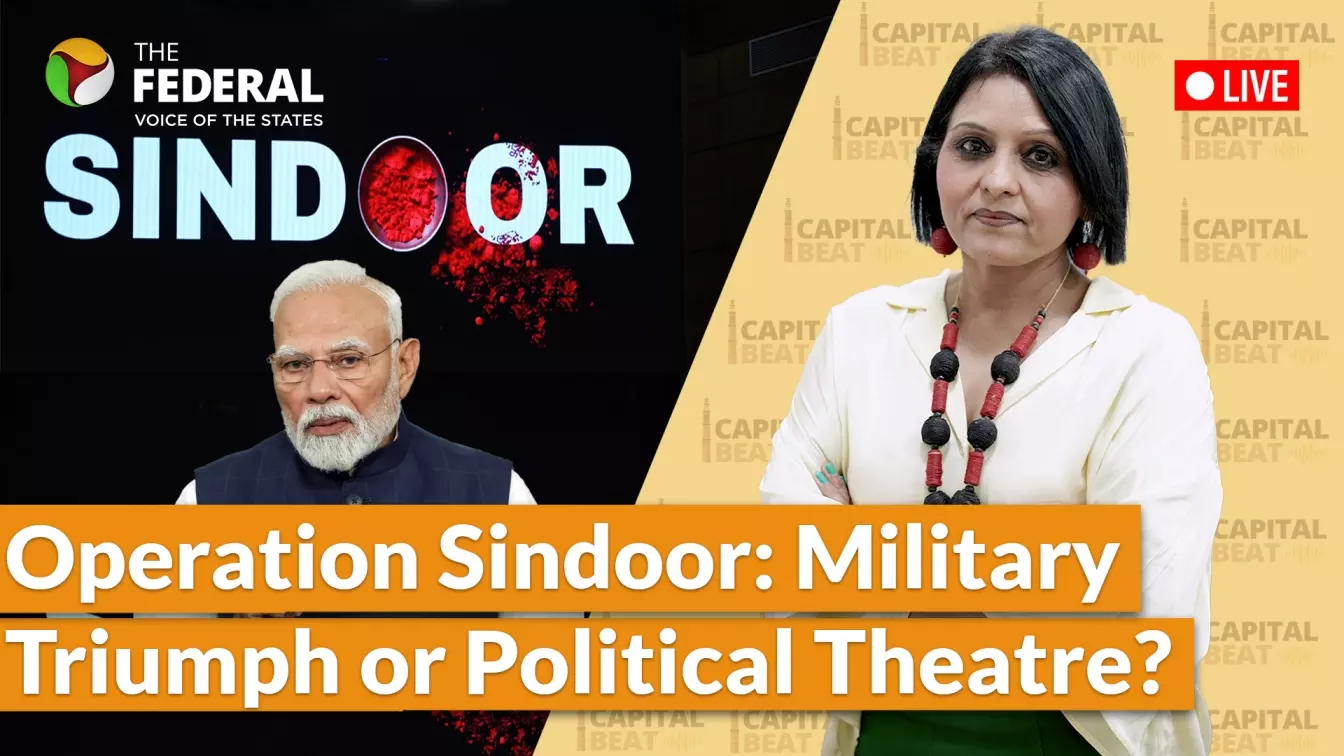
PM Modi's 'political marketing' of Operation Sindoor
Is Operation Sindoor's 'political marketing' justified? | Capital Beat
As global delegations defend Operation Sindoor, Modi hits the road with rallies and symbolism. Is this political messaging or a clear double narrative?

In this episode of Capital Beat, host Neelu Vyas is joined by Prof Ajay Gudavarthy, columnist SN Sahu, and political commentator Vivek Deshpande to analyse Prime Minister Narendra Modi’s Gujarat roadshow and the broader political messaging around Operation Sindoor. As India sends multi-party delegations abroad to justify the military strike, Modi’s domestic campaign has sparked a debate over ethics, strategy, and nationalism.
Modi’s Gujarat optics
SN Sahu opened the debate by accusing PM Modi of exploiting military actions for electoral gain, calling his Gujarat rally—with BrahMos missile cutouts and visuals of Colonel Sophia Qureshi’s family showering petals—a “spectacle.” He likened it to Modi’s 2019 campaign, where martyrs were invoked despite Election Commission guidelines. “Modi is trying to spin a narrative to overcome the crisis created by the sudden ceasefire,” Sahu said.
He also questioned the orchestration behind Qureshi’s family’s presence. “Why was the district collector involved in bringing them?” he asked, calling the event “stage-managed.” According to Sahu, this was an attempt to distract from BJP’s internal leadership crisis and public criticism over the ceasefire.
Celebration or propaganda?
Vivek Deshpande agreed the Gujarat event was not a spontaneous celebration, but a managed campaign. “Where were these celebrations when the operation ended? Even Modi supporters were confused,” he pointed out. Comparing it to past cricket celebrations, he asked why the public didn’t naturally take to the streets.
He linked Modi’s “sindoor in my blood” statement with an earlier “commerce runs through my veins” remark to suggest calculated symbolism. “He’s making commerce out of Sindoor,” Vivek claimed, calling the roadshows a tool to revive Modi’s support base through well-timed propaganda.
Brief abroad, blitz at home
Ajay Gudavarthy explored the dichotomy between the opposition-led multi-party delegations defending India globally and Modi’s domestic political messaging. “Opposition leaders are doing it responsibly, without taking credit. But Modi is converting this into political capital at home,” he said.
He warned that this could suppress questions about intelligence failure, global isolation, and accountability. “Modi’s strategy is to shift attention, label dissenters as anti-national, and frame critics as pro-Pakistan,” he added.
Nationalism as a smokescreen
Vivek returned to underline how Modi has repeatedly used nationalism to deflect scrutiny. “He knows how to decouple governance from popularity. When he lacks achievement, he uses war and nationalism as tools,” he said, referring to the disappointing fallout of Operation Sindoor.
“The public was expecting a historic win, but were left confused. Modi’s speeches and visuals are meant to reignite that missing spark,” Vivek said, concluding that propaganda has become Modi’s default mode of political sustenance.
Women empowerment or war marketing?
Ajay Gudavarthy raised another critical point—why was the campaign being branded as women empowerment? “It’s an attempt to appeal to Bihar’s women voters by connecting Sindoor symbolically to cultural sentiment,” he said. But Gudavarthy questioned the logic: “If you truly want to empower women, talk about education, employment, and safety—not war.”
He warned of a dangerous “web of narratives” where war, religion, gender, and nationalism are interwoven into a singular election script. “This isn't just election strategy; it's a deeper redefinition of Indian democracy,” he said.
A dangerous electoral trend
In his closing remarks, Gudavarthy stressed the dangers of normalising war-based electoral campaigns. “War must be a last resort, not a campaign theme. Once war becomes a vote-catching tool, issues of the common people vanish, dissent is criminalised, and public debate dies.”
He concluded by urging the electorate to demand real political alternatives. “We must ask: should elections be fought over war? If not, we need to stop glorifying conflict and start talking about governance.”
The content above has been generated using a fine-tuned AI model. To ensure accuracy, quality, and editorial integrity, we employ a Human-In-The-Loop (HITL) process. While AI assists in creating the initial draft, our experienced editorial team carefully reviews, edits, and refines the content before publication. At The Federal, we combine the efficiency of AI with the expertise of human editors to deliver reliable and insightful journalism.

